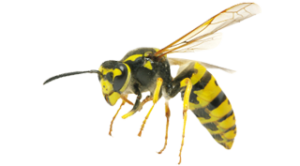
Wasps, Yellow Jackets, Bees.
Wasps may be beneficial for the ecosystem, but their stings are anything but pleasant. For homeowners, understanding how to avoid wasp attacks can make your time outdoors safer and more enjoyable. Here are some essential tips to keep those pesky insects at bay.
Key Tips for Avoiding Wasp Attacks
Maintain Good Sanitation
Wasps forage for food that humans discard. Ensure your garbage bins are tightly sealed and clean up food scraps and spills immediately to avoid attracting them.
Avoid Perfumes and Colognes
Strong scents like perfumes, colognes, and even certain deodorants can attract wasps. Opt for unscented products when spending time outdoors.
Wear Neutral Clothing
Bright or loud clothing can attract wasps. Stick to neutral colors like white, beige, or light gray to remain less conspicuous.
Inspect for Nests
Regularly check your property for wasp nests, especially in secluded areas like eaves, sheds, and garages. Removing a nest early can prevent a larger infestation.
Cover Up
Wear clothing that covers your arms, legs, and neck when you know you’ll be in areas where wasps are prevalent. A hat with a wide brim can also help protect your face.
Don’t Fight, Walk Away
If you encounter a wasp, try to remain calm and walk away slowly. Swatting at them or making sudden movements can provoke an attack.
Stand Still
If a wasp is flying around you, stand still. Moving erratically can make you appear as a threat.
Safe Distance from Nests
If you spot a nest, maintain a safe distance of at least 100 feet. Wasps are territorial and will defend their nest aggressively.
Use Repellents
Certain scents like peppermint, lemongrass, and vinegar act as natural repellents for wasps. Consider using these around your home to deter them.
Avoid Pools
If a wasp attacks you near a pool, avoid jumping in. They may continue to attack when you surface, increasing the risk of drowning.
Handling Attacks
If a wasp lands on you, remain calm and don’t swat at it. If you’re attacked, avoid the nesting area for at least a week as wasps can remember and target you.
Use Insecticides Safely
If you need to spray a general-use insecticide, ensure you are fully covered to avoid stings. Follow all instructions on the product label.
Conclusion
By following these tips, you can significantly reduce the risk of wasp attacks and enjoy your outdoor spaces more comfortably. Remember, the key is to avoid provoking wasps and to maintain good sanitation practices.
For more tips on pest control and home safety, feel free to reach out to our team of experts. Stay safe and enjoy a wasp-free environment! For Professional help call the Professionals at HI-TECH PEST CONTROL (248) 569-8001.
